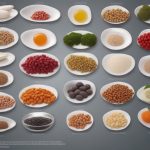Maintaining optimal urological health often involves dietary considerations, as what we consume can significantly impact bladder function, kidney health, and overall urinary tract wellness. Many individuals seeking to manage conditions like interstitial cystitis (IC), overactive bladder (OAB), or simply reduce the risk of urinary issues find that adjusting their diet is a crucial step alongside medical treatments. A “urology diet” isn’t necessarily a rigid set of rules, but rather an approach focused on identifying and minimizing foods and beverages that exacerbate symptoms while prioritizing those that support urinary tract health. This article will explore essential pantry staples that align with these principles, offering practical guidance for building a supportive and nourishing dietary foundation. It’s important to remember that individual sensitivities vary greatly, so what works well for one person may not work for another; personalized experimentation is key, ideally in consultation with healthcare professionals.
The cornerstone of a urology-friendly diet revolves around minimizing irritants known to trigger symptoms. These commonly include caffeine, alcohol, acidic foods and beverages, artificial sweeteners, spicy foods, and carbonated drinks. However, simply removing these items isn’t enough; it’s equally important to actively incorporate nourishing alternatives that provide essential nutrients and support overall well-being. A well-stocked pantry filled with the right staples empowers you to create balanced, flavorful meals without compromising your urinary health. This approach focuses on abundance rather than restriction, making dietary changes more sustainable and enjoyable in the long run. Focusing on whole, unprocessed foods is paramount.
Building a Foundation: Core Pantry Staples
A solid foundation for any urology diet begins with staples that are generally well-tolerated and offer significant nutritional benefits. These aren’t flashy superfoods; they’re the everyday ingredients that form the basis of healthy meals. Whole grains are an excellent starting point, offering fiber and sustained energy without the acidity found in many processed cereals. Consider options like brown rice, quinoa, oats (steel-cut or rolled), and barley. These provide a satisfying base for meals and can be incorporated into breakfast, lunch, or dinner. Similarly, legumes – lentils, chickpeas, kidney beans – are nutritional powerhouses packed with protein and fiber, supporting digestive health which is closely linked to overall wellness. Choosing dried beans and soaking them yourself often reduces the sodium content compared to canned varieties.
Beyond grains and legumes, focus on healthy fats and lean proteins. Olive oil, avocado oil, and flaxseed oil provide essential fatty acids while remaining generally gentle on the bladder. Lean protein sources like chicken breast, turkey, and fish (especially salmon rich in omega-3s) are preferable to red meat which can be harder to digest for some. Finally, don’t underestimate the power of herbs and spices – many offer anti-inflammatory properties that may benefit urological health, though individual tolerance should always be considered. For example, ginger and turmeric have been studied for their potential benefits. Remember, hydration is crucial and readily available sources like herbal teas (carefully chosen – see below) should also form part of your pantry arsenal. To help with this, consider exploring the options in the best hydrating herbs for daily urology support.
Hydration & Soothing Choices: Beverages & Alternatives
Adequate hydration is non-negotiable for urological health, but the type of fluids you consume matters greatly. Water remains the gold standard, and maintaining consistent intake throughout the day is essential. However, plain water can sometimes feel monotonous. Herbal teas, when carefully selected, offer a flavorful alternative – chamomile, peppermint (for some; it can be irritating for others), and ginger tea are often well-tolerated choices. Avoid black tea, green tea, and caffeinated herbal teas as they contain compounds that can irritate the bladder. Fruit-infused water is another excellent option, using naturally mild fruits like cucumber or pear.
Beyond water and gentle herbal teas, consider alternatives to sugary drinks. Coconut water provides electrolytes without excessive sweetness. Diluted cranberry juice (unsweetened) is sometimes recommended for urinary tract health, but it’s important to note that its effectiveness varies, and large quantities can be acidic. Always dilute cranberry juice heavily with water. Finally, avoiding alcohol entirely or limiting it significantly is crucial, as it’s a well-known bladder irritant. Many individuals find that even small amounts of alcohol trigger symptoms. Listen to your body and adjust fluid intake accordingly.
Identifying & Managing Triggers: Personalized Approach
One of the most important aspects of a urology diet is recognizing individual triggers. What bothers one person may not bother another, making personalization essential. This requires careful observation and potentially keeping a food diary to track symptoms in relation to dietary choices. – Start by eliminating common irritants (caffeine, alcohol, acidic foods) for a period of time – typically 2-4 weeks. – Reintroduce foods one at a time, carefully monitoring your body’s response. – Pay attention not just to bladder symptoms but also to digestive changes, as gut health impacts urinary tract function.
This process can be challenging, but it’s the most effective way to identify specific problem foods. It’s crucial to avoid self-diagnosing or making drastic dietary changes without professional guidance. A registered dietitian specializing in urological conditions can provide tailored recommendations and support. Remember that sensitivity can change over time, so periodic reassessment is beneficial. Don’t assume a food you once tolerated will always be well-tolerated, and vice versa. For those looking to plan meals effectively, building a 3-meal plan for daily urology support can be extremely helpful.
The Role of Fiber & Gut Health
The health of your gut microbiome plays a significant role in overall wellness, including urological health. A diet rich in fiber supports a healthy gut by providing nourishment for beneficial bacteria. As mentioned earlier, whole grains, legumes, fruits (low-acidity options like pears and blueberries), and vegetables are excellent sources of fiber. Fiber promotes regular bowel movements, preventing constipation which can put pressure on the bladder and exacerbate symptoms. Furthermore, a thriving gut microbiome contributes to a stronger immune system and reduces inflammation throughout the body.
Consider incorporating probiotic-rich foods into your diet, such as yogurt (if tolerated; dairy sensitivity is common) or kefir. Fermented vegetables like sauerkraut and kimchi can also provide beneficial bacteria, but be mindful of sodium content. Prebiotics – found in foods like garlic, onions, and bananas – feed the beneficial bacteria already present in your gut, further enhancing microbiome health. A healthy gut-bladder connection is increasingly recognized as essential for managing urological conditions. If you have overlapping IBS concerns, urology diet advice for men with IBS overlap might be particularly relevant.
Beyond Food: Lifestyle & Supplement Considerations
While dietary changes are paramount, a holistic approach to urological health includes lifestyle factors beyond food. Regular exercise supports overall wellness and can reduce stress which often exacerbates bladder symptoms. Stress management techniques like yoga, meditation, or deep breathing exercises can also be beneficial. Adequate sleep is crucial for bodily repair and restoration. Finally, consider the potential role of supplements, but always discuss with your healthcare provider before starting any new regimen.
Certain vitamins and minerals, such as Vitamin D and magnesium, may play a role in urinary tract health, but deficiencies should be identified through testing before supplementation. Some individuals find relief from bladder pain using natural supplements like D-mannose or quercetin, but these are not suitable for everyone and require careful consideration. Remember that supplements are not a substitute for medical treatment or a healthy diet. A proactive and integrated approach – combining dietary changes, lifestyle modifications, and appropriate medical care – is the most effective path to long-term urological well-being. For those over sixty, it’s good to review the best diet practices for men over 60.





















